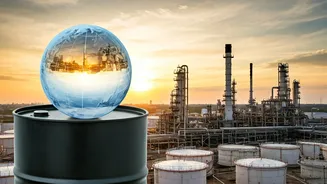Trump's Unverified Claim
In a recent turn of events, Donald Trump made a claim that has sparked significant diplomatic ripples. According to Trump, he had been told by India's
Prime Minister Narendra Modi that India would cease purchasing oil from Russia. This announcement, made during a period of international scrutiny on Russia's energy trade, was promptly met with denial from the Indian government. The former US President's statement has raised several questions regarding the accuracy of his account and the potential implications for US-India relations. The nature of these discussions and how they are interpreted by different parties remain at the center of this diplomatic puzzle. The situation underscores the importance of clear and verified communication in international affairs.
India's Firm Rejection
The Indian government responded swiftly and emphatically to Trump's claim. Official statements from Indian authorities have categorically dismissed any discussions or agreements of the nature suggested by Trump. India's stance underscores its sovereign right to make decisions regarding its energy procurement. The nation continues to emphasize that it follows a market-driven approach to its energy choices, a position reflecting its commitment to ensuring energy security. India's actions in the global oil market reflect its economic and strategic priorities, and these choices are made independent of external pressures. This resolute denial highlights the significance of maintaining transparency and accuracy in international dialogues and underscores India's position in global energy dynamics.
Energy Choices Explained
India's approach to energy sourcing is predicated on market dynamics and strategic interests. The country's decision to procure oil from various global sources, including Russia, is guided by factors such as pricing, supply reliability, and overall energy security needs. The government's emphasis on market-driven decisions reflects a pragmatic approach to navigating the complexities of the international oil market. India's pursuit of diverse energy sources is a critical component of its broader economic and diplomatic strategy. The nation's ability to maintain flexibility in energy procurement is essential for its economic growth and stability. India's commitment to prioritizing its own interests in energy matters demonstrates its autonomy in global affairs.
Diplomatic Implications Examined
The recent exchange between Trump and the Indian government has significant implications for diplomatic relations between the United States and India. Such instances underscore the potential for misunderstandings or misrepresentations that can occur in international communications. The incident is a reminder of the need for clear, verifiable information in diplomatic circles. The accurate documentation of high-level conversations and interactions is crucial for maintaining trust and stability in global relationships. As the world becomes increasingly interconnected, the ability to effectively manage information and perceptions will continue to play a crucial role in international affairs. This event serves as a case study in the dynamics of international diplomacy and the challenges of accurately conveying information.
Global Oil Market Context
The backdrop of the global oil market is crucial to understanding this situation. International oil prices, supply routes, and geopolitical considerations all influence the decisions made by major energy consumers and suppliers. Russia's role as a major oil producer and its relationships with various nations are important factors to keep in mind. India, as one of the world's largest consumers of oil, is constantly monitoring global oil supply and price trends. Global market forces heavily influence India's energy sourcing. As nations adjust to the shifting dynamics of the world energy market, it will be interesting to watch how this event changes the market. The complex interplay of economics and diplomacy continues to shape the global energy landscape.













